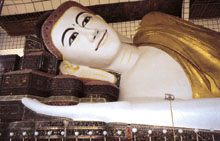|
The Mahaparinibbana Sutta from
the Long Discourse of Pali Tipitaka ko, is without doubt the most
reliable source for details on the death of Siddhattha Gotama (BCE 63-483), the
Lord Buddha. It is composed in a narrative style that allows readers to follow
the story of the last days of the Buddha, beginning a few months before he died.
To understand what really happened to the Buddha is not a simple matter, though.
The sutta, or discourse, paints two conflicting personalities of the Buddha,
one overriding the other.
The first personality was that of a
miracle worker who beamed himself and his entourage of monk across the Ganges
River (D II, 891) who had a divine vision of the settlement of gods on earth (D
II, 87), who could live until the end of the world on condition that someone invite
him to do so ID II, 103), who determined the time of his own death (DII. 1051,
and whose death was glorified by the shower of heavenly Bowers and sandal powder
and divine music (D II, 1381).

The other personality was that an old man who grumbled about his failing health
and growing senility ID II, 120), who almost lost his life because of a severe
pain during his last retreat at Vesali (D II. 100) and who was forced to come
to terms with Isis unexpected illness and death after consuming a special cuisine
offered by his generous host. These two personalities take turns emerging in different
parts of the narrative.
Moreover, there also appear to be two explanations
of the Buddha's cause of death:
- One is that the Buddha died because
his attendant, Ananda, failed to invite him to live onto the age of the world
or even longer (D II, 117).
- The other that he died by a sudden illness
which began after he ate what is known as 'Sukaramaddava" (D II. 127-157).
The former story was probably a legend, or the result of a political struggle
within the Buddhist community during a stage of transition, whereas, the latter
sounds more realistic and accurate in describing a real life situation that happened
in the Buddha's last days.
A number of studies have focused on
the nature of the special cuisine that the Buddha ate during his last meal as
being the agent of his death. However, there is also another approach based on
the description of the symptoms and signs given in the sutta, which modern medical
knowledge can shed light on.
What we know In
the Mahaparinibbana Sutta we are told that the Buddha became ill
suddenly after he ate a special delicacy, Sukaramaddava, literally translated
as "soft pork", which had been prepared by his generous host, Cunda
Kammaraputta.
The name of the cuisine has attracted the attention of many
scholars, and it has been the focus of academic research on the nature of the
meal or ingredients used in the cooking of this special dish. 1The sutta itself
provides details concerning the signs and symptoms of his illness in addition
to some reliable information about his circumstances over the previous four months,
and these details are also medically significant.
The
sutta begins with King Ajatasattus' plot to conquer a rival state, Vajji. The
Buddha had journeyed to Vajji to enter his last rainy-season retreat. It was during
this retreat that he fell ill. The symptoms of the illness were sudden, severe
pain. However, the Sutta provides no description of the location and character
of his pain. It mentions his illness briefly, and says that the pain was intense,
and almost killed him.
Subsequently, the Buddha was visited by Mara, the
God of Death, who invited him to pass away.
The Buddha did not accept the
invitation right away. It was only after Ananda, his attendant, failed to recognize
his hint for an invitation to remain that he died. This piece of the message,
though tied up with myth and supernaturalism, gives us some medically significant
information. When the sutta was composed, its author was under the impression
that the Buddha died, not because of the food he ate, but because he already had
an underlying illness that was serious and acute - and had the same symptoms of
the disease that finally killed him.
Suite
de l'article
|